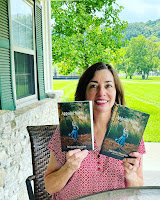Admittedly, I didn't know much Tennessee history until my husband and I moved here in 2017. I often say I was like a sponge after we arrived, soaking up all the fascinating historical tidbits I could find. I've fallen so in love with the gorgeous state of Tennessee that my last three historical novels--as well as the next two!--are set here!
However, unbeknownst to me until recently, my roots go back to Tennessee. In fact, they go all the way back to one of the founders of Nashville! I'll tell you a little more about my 5th great grandfather in a bit, but first...a little Tennessee history.
I blogged about Nashville's history a few months after we moved here. You can check it out, as I won't cover all of that information today. But what I didn't mention in that post was the Cumberland Compact that was signed by approx. 250 (the numbers vary depending on the source) early settlers to the area that would eventually become Nashville.
As you can imagine, Tennessee in the late 1700s was a wild and rough place to live. Early settlers faced hardships of all kinds: weather, wild animals, untamed land, and Native people who were not pleased to have their territories overrun with white people.
But after the Revolutionary War ended, more and more people came seeking a new life in the frontier. By 1780 it was decided permanent law and order was necessary if they were to move forward with any semblance of civility.
Thus, the Cumberland Compact was created.
 |
| My 5th Great Grandfather's signature is in the first column, 9th signature. He signed it in Dutch |
With the compact in place, Tennessee went on to statehood, and the rest, as they say, is history. My connection to the Cumberland Compact is really cool but a little troubling too. Of the 250 signers, my 5th great grandfather, Frederick Stump, was one of the early settlers who took part in the creation of the compact. I was pretty amazed when I discovered this through Ancestry. I promptly did some research and found that Frederick and his family not only lived in Nashville, but that the house they lived in is still standing and is a registered historical site! Upon discovering this cool fact, hubby and I jumped in our truck and drove to see it despite the cold, wet weather.
 |
| Frederick built this tavern/inn in 1789 |
Your turn: Do you have any notorious ancestors hidden away in the closet? Do tell!
Michelle Shocklee is the author of several historical novels, including Count the Nights by Stars, winner of the 2023 Christianity Today Book Award, and Under the Tulip Tree, a Christy Awards and Selah Awards finalist. Her work has been included in numerous Chicken Soup for the Soul books, magazines, and blogs. Married to her college sweetheart and the mother of two grown sons, she makes her home in Tennessee, not far from the historical sites she writes about. Visit her online at www.MichelleShocklee.com
APPALACHIAN SONG
Forever within the memories of my heart.
Always remember, you are perfectly loved.
Thirty years later, the day after his father’s funeral, Walker Wylie is stunned to learn he was adopted as an infant. The famous country singer enlists the help of adoption advocate Reese Chandler in the hopes of learning why he was abandoned by his birth parents. With the only clue he has in hand, Walker and Reese head deep into the Appalachian Mountains to track down Bertie Jenkins, the midwife who holds the secrets to Walker’s past.
https://www.tyndale.com/p/appalachian-song/9781496472441






Very interesting. With my mom's family hailing from Alabama before my grandparents moving the small family of three to Ohio, I do have ancestors who fought in the Confederate military and owned slaves. They weren't wealthy but the slaves helped with farmwork. I have no idea how well they treated their slaves but I like to think they treated them well.
ReplyDeletemoved the small family
DeleteYeah, I knew all about my Union ancestors and am proud of them, so it's been hard to swallow that I also have ancestors who owned slaves, etc.
DeleteThank you for posting today. I confess that I have a cousin who is into all the genealogy stuff and I can't remember one bit of it because I don't write down what she says when I'm with her. I know, as much as I love this blog, I should pay more attention. Thank you for sharing your family history. I'm sure we all have "those" relatives. Times were very different then.
ReplyDeleteConnie, you're so right. We all have "those" relatives. Thanks!
Delete